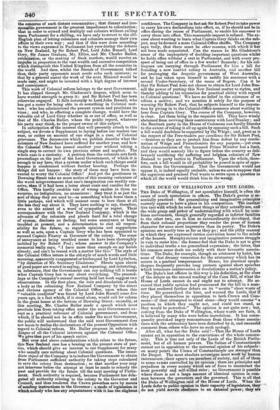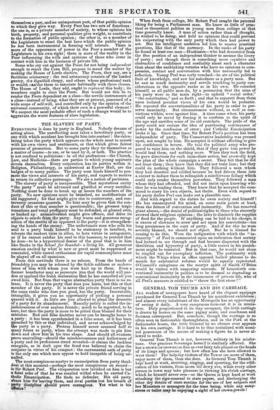THE DUKE OF WELLINGTON AND THE LORDS. THE Duke of
Wellington, if not speculative himself, is often the cause of much speculation in others. The Duke's genius is es- sentially practical : the generalizing and imaginative principles scarcely appear to have a place in his composition. The
tive tact with which he sees most things as they actually are, and the wide grasp and power of understanding with which he com- bines moVeznents, though generally regarded as inferior faculties to the other two, i are n him so extraordinarily developed, that from their colossal proportions they render the prose of human character for once more impressive than its poetry. The Duke's opinions are mostly true as far as they go ; and the pithy manner in which they are expressed carries conviction home to the minds of the hearers. Metaphysicians and imaginative persons struggle in vain to resist him : the former feel that the Duke is apt to give to individual truths a too generalized expression ; the latter, that his common sense deals too rudely with their favourite associa- tions. The Duke, for example, though an aristocrat by habit, has none of that dreamy veneration for the aristocracy which has its source in a poetical temperament. Hence, his practical apoph- thegms frequently provoke long protests against short speeches which terminate controversies or revolutionize a nation's policy. The Duke's last offence in this way is his definition, at the close of the debate on the second reading of the Corn Bill, of what the House of Lords cannot do and ought not to attempt. He as- sumed that public opinion had pronounced for the bill in a man- ner that rendered further debate on its " merits " sheer waste of time. He generalized the hint, and warned the Lords, that if they placed themselves in opposition to both Crown and Com- mons—if they attempted to stand alone—they would assume "a position in which they ought not, and could not stand, as they would be powerless." The opinion is not quite new ; but, coming from the Duke of Wellington, whose words are facts, it is believed by many who were before incredulous. It has conse- quently provoked angry remonstrance from those whose associa- tions with the aristocracy have been disturbed by it, and uncandid comment from others who have no such apology. After all, what has the Duke said ?—That the House of Lords cannot act in opposition to the convictions of the whole commu- nity. This is true not only of the Lords of the British Parlia- ment, but of all human powers. The Sultan of Constantinople cannot act in opposition to the universal opinion of his subjects : on many points the Ulema of Constantinople are stronger than the Despot. The most absolute sovereigns must work by human instruments ; their agents are members of society, and all of them to some extent controlled by its opinion ; there are principles and prejudices in every society which are of force to counteract the most powerful and self-willed ruler ; no Government is possible where there is not a large amount of identical opinion in com- mon between the governors and the governed. This is all that the Duke of Wellington said of the House of Lords. When the Lords defer to public opinion in their capacity of legislators, they do not yield servile obedience to an ezt.ernal power; they are themselves a part, and no unimportant part, of that public opinion to which they give way. Every Peer has two sets of functions : the one is, as a private member of society, to whose opinions his birth, property, and personal qualities give weight, to contribute to the formation of public opinion; the other is, as a member of the Legislature to enact the hest laws which the public opinion he has been instrumental in forming will tolerate. There is more of the appearance of power in the Peer a member of the Legislature in his own right; there is more of the reality in the Peer influencing the wills and opinions of those who come in contact with him in the business of private life. Some who cry out against the Peers for not being intkpendent enough to reject the Corn Bill, propose to mend the matter by making the House of Lords elective. The Peers, they say, are a factitious aristocracy: the real aristocracy consists of the landed gentry, the dignified clergy, and others whose professional rank or wealth (nables them to associate habitually with these classes. The House of Lords, they add, ought to represent this body ; its members ought to elect the Peers. But would not this be to render the Peers dependent on a class—the servile instruments of a class—instead of being, what they are at present, possessed of a wide scope of self-will, and controlled only by the opinion of the universal community, of which their own is a powerful element ? We suspect the most probable effect of such a change would be to aggravate the worst features of class legislation.-



















































 Previous page
Previous page